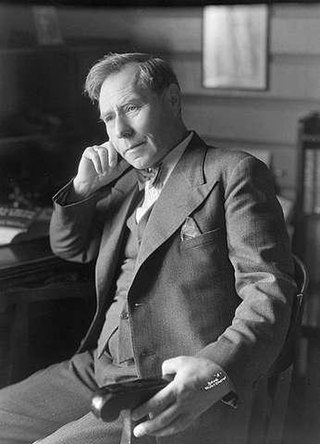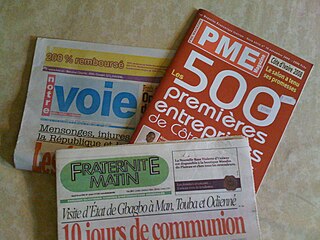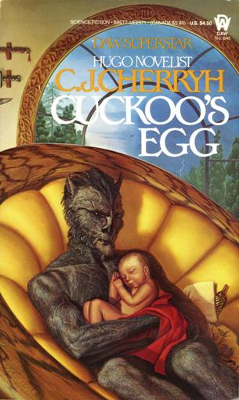Related Research Articles

Niger–Congo is a hypothetical language family spoken over the majority of sub-Saharan Africa. It unites the Mande languages, the Atlantic-Congo languages, and possibly several smaller groups of languages that are difficult to classify. If valid, Niger-Congo would be the world's largest in terms of member languages, the third-largest in terms of speakers, and Africa's largest in terms of geographical area. It is generally considered to be the world's largest language family in terms of the number of distinct languages, just ahead of Austronesian, although this is complicated by the ambiguity about what constitutes a distinct language; the number of named Niger–Congo languages listed by Ethnologue is 1,540.

The Senufo or Senufic languages has around 15 languages spoken by the Senufo in the north of Ivory Coast, the south of Mali and the southwest of Burkina Faso. An isolated language, Nafaanra, is also spoken in the west of Ghana. The Senufo languages constitute their own branch of the Atlantic–Congo sub-family of the Niger–Congo languages. Garber (1987) estimates the total number of Senufos at some 1.5 million; the Ethnologue, based on various population estimates, counts 2.7 million. The Senufo languages are bounded to the west by Mande languages, to the south by Kwa languages, and to the north and east by Central Gur languages.

The Songhay, Songhai or Ayneha languages are a group of closely related languages/dialects centred on the middle stretches of the Niger River in the West African countries of Mali, Niger, Benin, Burkina Faso and Nigeria. In particular, they are spoken in the cities of Timbuktu, Djenné, Niamey and Gao. They have been widely used as a lingua franca in that region ever since the era of the Songhai Empire. In Mali, the government has officially adopted the dialect of Gao as the dialect to be used as a medium of primary education.

The Mande languages are a group of languages spoken in several countries in West Africa by the Mandé peoples. These include; Maninka, Mandinka, Soninke, Bambara, Kpelle, Jula, Bozo, Mende, Susu, and Vai. There are around 60 to 75 languages spoken by 30 to 40 million people, chiefly in; Burkina Faso, Mali, Senegal, the Gambia, Guinea, Guinea-Bissau, Sierra Leone, Liberia, Ivory Coast, Mauritania, Ghana and also in northwestern Nigeria and northern Benin.

N'Ko is an alphabetic script devised by Solomana Kanté in 1949, as a modern writing system for the Manding languages of West Africa. The term N'Ko, which means I say in all Manding languages, is also used for the Manding literary standard written in the N'Ko script.

The Manding languages are a dialect continuum within the Mande language family spoken in West Africa. Varieties of Manding are generally considered to be mutually intelligible – dependent on exposure or familiarity with dialects between speakers – and spoken by 9 million people in the countries Burkina Faso, Senegal, Guinea-Bissau, Guinea, Liberia, Ivory Coast and the Gambia. Their best-known members are Mandinka or Mandingo, the principal language of The Gambia; Bambara, the most widely spoken language in Mali; Maninka or Malinké, a major language of Guinea and Mali; and Jula, a trade language of Ivory Coast and western Burkina Faso. Manding is part of the larger Mandé family of languages.
The Suppire–Mamara languages form the northern branch of the Senufo language family and are mainly spoken in Mali. They comprise five different languages, totalling approximately 750,000 speakers. The Northern Senufo languages are separated from the Central Senufo languages by a small band of Mande speaking people. To the east and west, they are also bordered mainly by Mande languages like Bambara and Dioula, and they have been influenced considerably by those languages in both vocabulary and grammar.

Olav Duun was a writer of Norwegian fiction. He is generally recognized to be one of the more outstanding writers in Norwegian literature. He once lacked only one vote to receive the Nobel Prize in Literature, and was nominated twenty-four times, in fourteen years.
The Mandé peoples are an ethnolinguistic grouping of native African ethnic groups who speak Mande languages. Various Mandé speaking ethnic groups are found particularly in the western regions of West Africa. The Mandé-speaking languages are divided into two primary groups: East Mandé and West Mandé.

Ivory Coast is a multilingual country with an estimated 78 languages currently spoken. The official language, French, was introduced during the colonial period. This language is taught in schools and serves as a lingua franca in the country, along with Dioula.

Cuckoo's Egg is a science fiction novel by American writer C. J. Cherryh, which introduces a fictional race raising a human boy. It was published by DAW Books in 1985, and there was also a limited hardcover printing by Phantasia Press in the same year. The book was nominated for the Hugo Award and longlisted the Locus Award for Best Novel. It was later reprinted along with Cherryh's novel Serpent's Reach in the 2005 omnibus volume The Deep Beyond.
Boko, or Boo, is a Mande language of Benin and Nigeria.
Shanga is a Mande language of Nigeria.
Sembla, or Seenku, is a Western Mande language within the Samogo group of Burkina Faso. The northern and southern dialects, Timiku and Gbeneku, are easily intelligible.
Duun is a Mande language of Mali. There are three varieties of Duun, West Duun, or Duungooma and Banka or Bankagooma, in Mali, and East Duun, or Dzùùn(goo), in Burkina Faso. These are clearly distinct but have a reasonable degree of mutual intelligibility with each other.
Banka, or Bankagooma, is a minor Mande language of Mali. There is a reasonable degree of mutual intelligibility with Duun.
Duun may refer to:
The Southern Mande languages are a branch of the Mande languages spoken across Ivory Coast and into Liberia.
The Eastern Mande languages are a branch of the Mande languages spoken in seven areas: northwest Burkina Faso, the border region of northern Benin and Nigeria, and one language, Bissa, also spoken in Ghana, Togo, and Ivory Coast and the Samo languages also spoken in Mali.